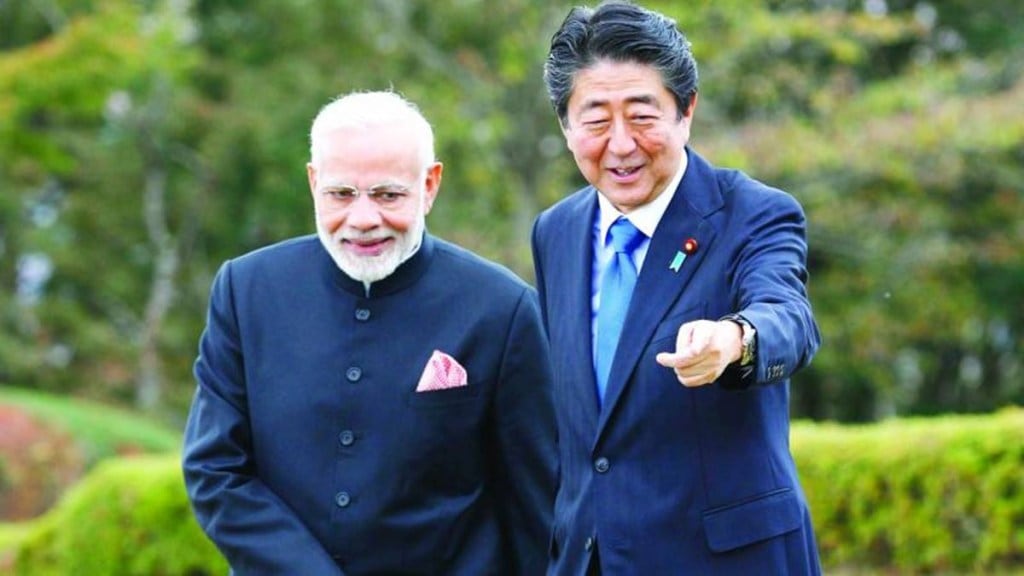By Simran Walia
July 8, 2023, would mark the first death anniversary of former Japanese Prime Minister Shinzo Abe. He was assassinated during a political rally in Nara, a city in Japan. Since last year, Japan has been engaged in numerous shifts in its foreign and security policy while taking forward Abe’s legacy. Serving as the PM of Japan for nine years, Abe was an eminent figure in Japanese politics and foreign policy.
One of the most notable developments under PM Abe was the ‘Free and Open Indo-Pacific’ vision in regard to Japan’s security policy. Countries like the US and India embraced it along with other like-minded countries such as Australia. Over time, several other middle powers like Canada and Europe have been working on securing a Free and Open Indo-Pacific vision. Since strategic competition has deepened between China and the US, India has been engaging more with the US-Japan alliance. In 2007, Abe visited India and delivered a speech titled ‘Confluence of the Two Seas’, wherein the idea of the Quad and Indo-Pacific came up.
As Japan’s PM, Abe also attempted and came up with the enactment of Peace and Security Legislation which authorised the exercise of the right to collective self-defence. However, Article 9 of the Japanese constitution renounces war and prohibits the possession of land, sea, and air forces. Nevertheless, Japan retained the right of individual self-defence under the constitution. Abe’s attempt to reinterpret the constitution to allow Japan to exercise its right to collective self-defence allowed strengthened coordination between Japan’s Self-defence forces (SDF) and the US military. Abe was the first Japanese Prime Minister to propagate Japan’s National Security Strategy (NSS). Thereafter, the strategy was framed to make revisions to National Defence Program Guidelines. During his tenure, Abe also deeply understood the need to boost the capabilities of the SDF. Abe also witnessed a revision to the bilateral US-Japan defence guidelines in 2015. This revision allowed Japan to take on a robust global role amidst increasing tensions regarding North Korea’s nuclear threats and China’s expansionist behaviour.
Regarding the foreign policy aspect of Japan, Abe was a strong advocate and in favour of a more assertive and proactive role of Japan in global affairs. He also focussed on the policy of proactive pacifism, which implied expanding Japan’s defence capabilities by keeping the principles of peace in line. This is seen in current PM Fumio Kishida’s tenure, wherein the NSS document was revised to focus on Japan’s plans to possess counterstrike capabilities. The revised document also mentioned increasing the defence spending by 2 per cent of its GDP by 2027, which shows a drastic transformation of Japan’s security strategy. This level of transformation is also widely linked to Abe’s attempt to focus on Japan’s security policy. Japan is now also working on bolstering its security cooperation with several middle-power countries such as Australia, France, the UK, Canada, and Europe while at the same time being embedded in the principles of being non-nuclear.
Abe’s legacy in terms of its approach to Japan’s foreign and security policy is also often termed ‘Abe’s doctrine,’ which is linked to Yoshida doctrine, that is, the Policy by Prime Minister Shigeru Yoshida after World War II which focused on the US role for the defence of Japan and also allowed Japan to focus on its economic growth. Furthermore, Abe also sought to improve Japan’s ties with East Asian neighbours such as South Korea and China despite the lingering historical tensions between these nations. He signed the Comfort Women Agreement in 2015 regarding South Korea’s issue with Japan. Abe also sought to improve relations with China in the bilateral summit held in 2019 wherein both nations agreed to third-country infrastructure cooperation. Despite such efforts by Abe, Japan’s relationship with South Korea and China remains strained. Abe was also not successful in reaching a peace treaty with Russia, and his inability to take a tough stance towards North Korea’s nuclear ambitions are a few foreign policy failures of Abe as the Prime Minister. Nevertheless, during Abe’s tenure, Japan’s relationship with India took a major boost under their Special Strategic and Global Partnership and Abe-Modi’s personal bond was a major highlight of their bilateral ties. Both Japan and India also share mutual concerns and interests regarding securing a Free and Open Indo-Pacific Vision (FOIP).
Despite these criticisms, Abe was successful in putting Japan on the path of a drastic evolution. Abe had always aimed to build a Japan free from its wartime atrocities and guilt that could make a reputable position on the geopolitical stage in the international arena. The current PM Kishida has considered all this and plans to refurbish Japan’s military spending, which also has US support. Kishida recently stated, “The reason I can manage this administration as prime minister is because of the foundation that Prime Minister Abe laid in both domestic and foreign affairs.” Abe’s legacy is going to continue to have a prominent impact on Japan’s security policy and perhaps will not fade away.
The author is an Associate Fellow at the Centre for Air Power Studies, New Delhi, pursuing a PhD in Japanese Studies from Jawaharlal Nehru University, Delhi (JNU). She has also completed M.Phil in Japanese Studies from JNU and has worked at Observer Research Foundation, in Delhi. Her research interests include Japanese politics and foreign policy, and Indo-Pacific and East Asian foreign policy too.
Disclaimer: Views expressed are personal and do not reflect the official position or policy of Financial Express Online. Reproducing this content without permission is prohibited.

